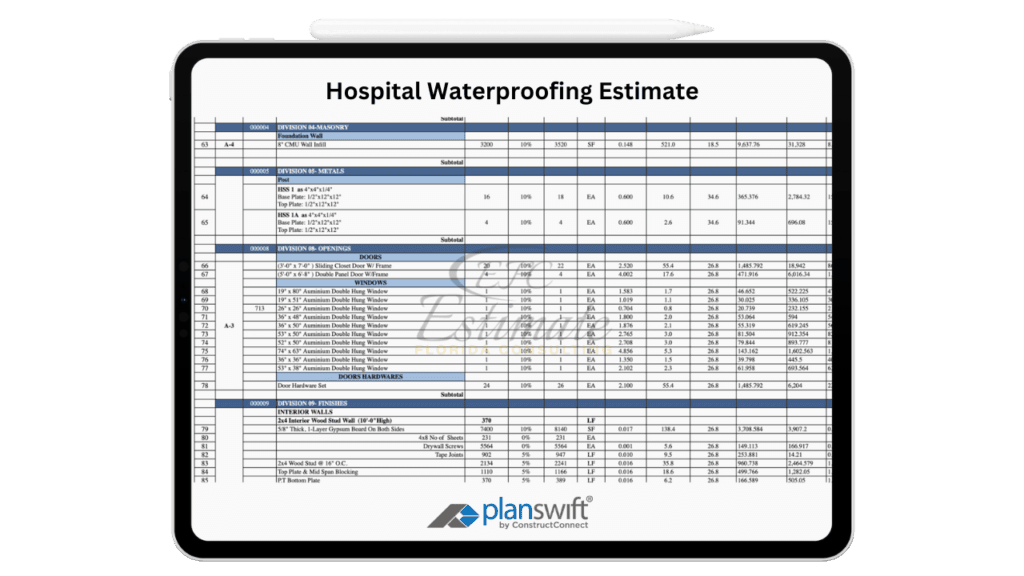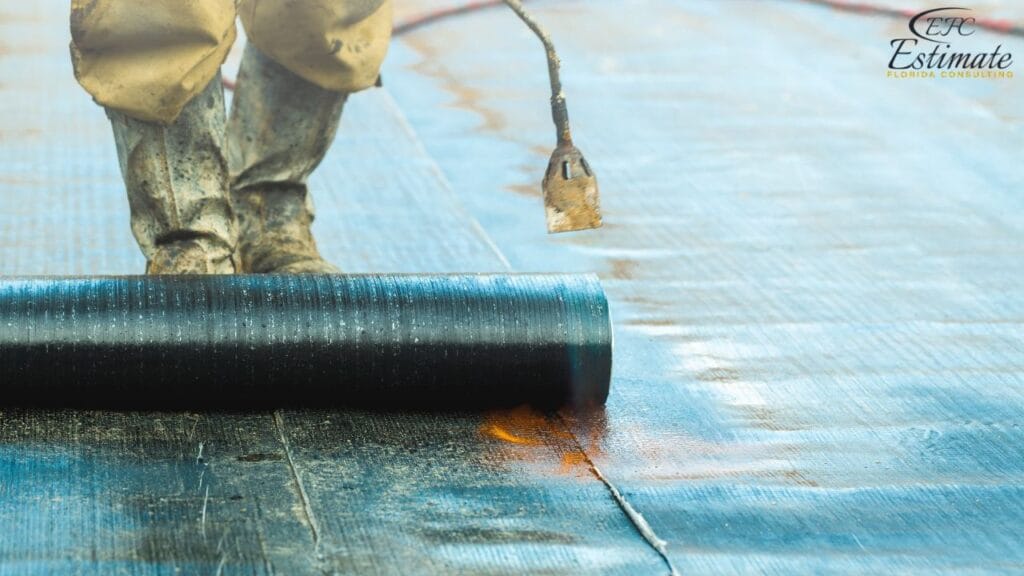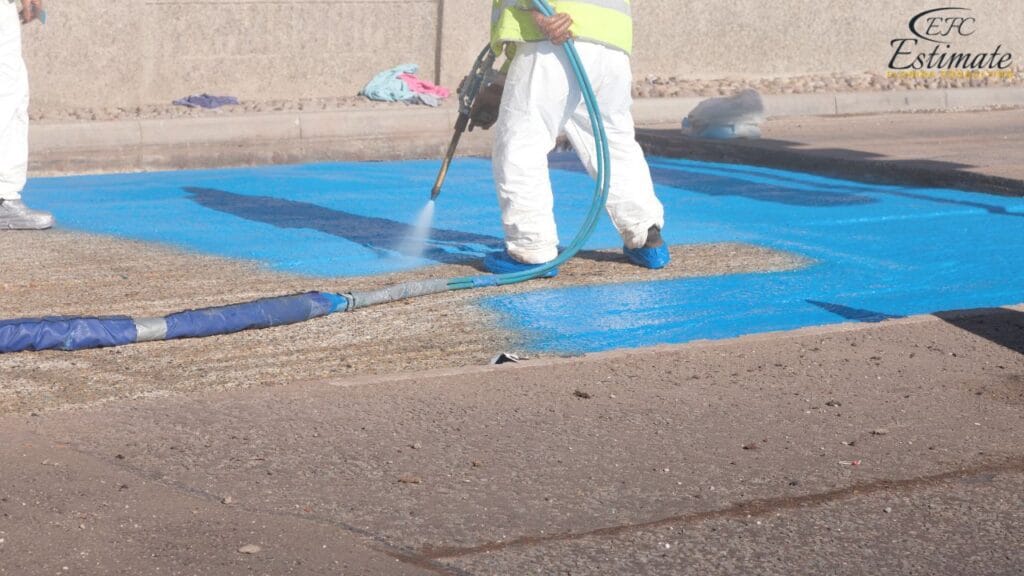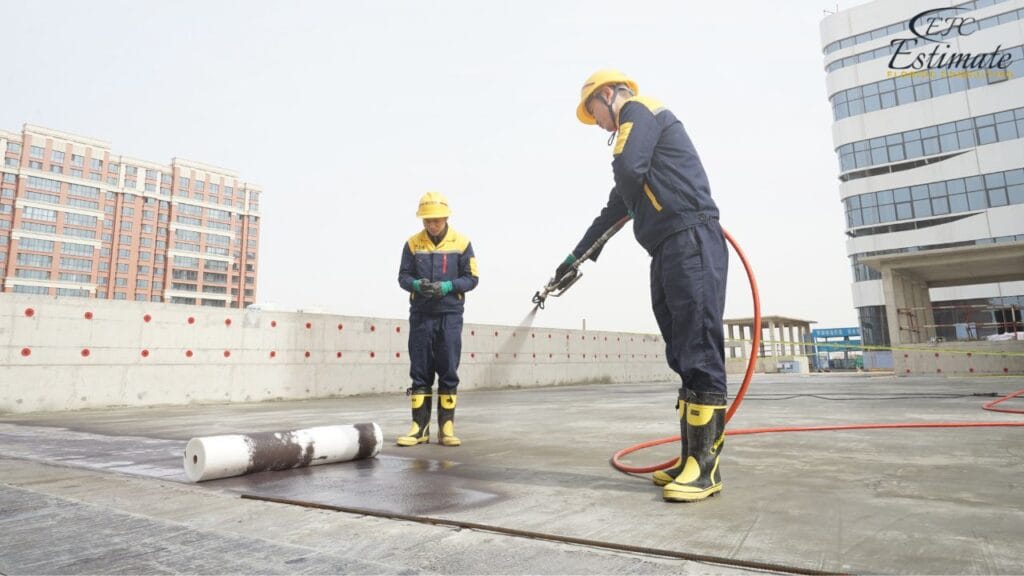90% More Chances to Win Projects With Our Estimate!
- Multi-Family Building
- Hotel Building
- Hospital Building
- Warehouse Building
- School & University Building
- High-Rise Building
- Shopping Complex
- Data Center Building

Hospital waterproofing involves applying specialized materials to prevent water intrusion, safeguarding the building’s structural integrity and maintaining a sterile environment. This is critical for healthcare facilities, where water damage can lead to mold growth, costly repairs, and potential health risks. Effective waterproofing systems not only protect the facility but also contribute to a healthier environment for patients and staff, reducing the likelihood of illness caused by damp conditions.

The total cost of waterproofing a hospital can vary widely based on several factors, including the size of the facility, the complexity of the waterproofing systems, and local labor rates. On average, you can expect to spend between $8,000 to $72,000 for a comprehensive waterproofing project, depending on the scope and requirements.
Basement waterproofing is particularly crucial in hospitals, where moisture can lead to severe structural damage. The cost for basement waterproofing typically ranges from $7.00 to $14.40 per square foot. Therefore, for a 5,000 square foot basement, the total cost could be approximately $35,000 to $72,000. This cost includes excavation, installation of waterproof membranes, and other necessary repairs.
Wall waterproofing protects against moisture intrusion, especially in below-grade areas. Costs for wall waterproofing can range from $6.00 to $13.20 per square foot. For a 10,000 square foot wall area, you might expect to pay between $60,000 to $132,000. This may also involve reinforcing the walls and ensuring that drainage systems are in place.
Roof waterproofing is vital to prevent leaks that can lead to costly repairs and disruptions. The average cost for roof waterproofing ranges from $4.80 to $12.00 per square foot. For a 15,000 square foot roof, costs could total between $72,000 to $180,000. Factors like roof slope, material used, and any necessary repairs prior to waterproofing can influence the overall cost.
For smaller hospitals, waterproofing costs generally range from $30,000 to $72,000, depending on the specific areas needing waterproofing and the chosen systems. This estimate includes comprehensive assessments of basements, walls, and roofs.
Medium-sized hospitals may incur costs ranging from $72,000 to $216,000, reflecting the additional complexity and larger surface areas requiring waterproofing. The installation of effective drainage systems can significantly impact the cost.
Large hospitals typically face costs starting at $216,000, with potential total costs exceeding $720,000 depending on the extent of waterproofing needed throughout the facility. These costs may involve specialized equipment and advanced waterproofing techniques.
Understanding the costs on a per-square-foot basis can help with budgeting and planning. Here’s a breakdown of average costs by different waterproofing systems:
Waterproofing System | Estimated Cost (Per Square Foot) |
Liquid-Applied Membrane | $7.20 – $10.44 |
Sheet Membrane | $8.64 – $12.96 |
Bentonite Clay | $8.64 – $13.80 |
Cementitious Waterproofing | $6.00 – $8.64 |
Several factors can significantly affect the overall cost of waterproofing a hospital, including:
Larger and more complex structures will require more materials and labor, resulting in higher costs. Facilities with unique architectural features may also necessitate specialized waterproofing solutions, further increasing expenses.
Different materials come with varying price points and levels of effectiveness. High-quality materials may have a higher upfront cost but can provide better long-term protection, reducing the need for future repairs.

Labor rates can fluctuate based on regional demand and the availability of skilled workers. In Florida, labor costs can vary widely, and it’s essential to budget accordingly.
The geographical location and existing site conditions can impact waterproofing costs. For example, sites prone to flooding or high groundwater levels may require additional measures to ensure adequate protection.
Installing features such as drainage systems, insulation, or ventilation can increase costs. However, these features may also enhance the overall effectiveness of the waterproofing system, contributing to long-term savings.
Selecting the appropriate waterproofing system is crucial for ensuring effective protection. Some common types of waterproofing systems include:
Liquid-applied membranes are versatile and can conform to various shapes and surfaces. They are particularly useful in areas with complex details, such as around pipes and penetrations. This system forms a seamless waterproof barrier, reducing the risk of leaks.
Sheet membranes are prefabricated and offer a reliable waterproofing solution. They can be installed quickly and provide excellent protection against water intrusion. This system is often used in below-grade applications and is known for its durability.
Bentonite clay systems utilize a natural, clay-based material that expands when wet, creating a waterproof barrier. This system is effective for below-grade applications and is eco-friendly, making it an attractive option for environmentally conscious hospitals.
Cementitious waterproofing involves applying a cement-based mixture to surfaces, providing a strong and durable barrier. This system is commonly used for areas exposed to water, such as basements and water tanks.
Bituminous waterproofing systems utilize asphalt-based materials, providing excellent water resistance. This type is often used on flat roofs and below-grade applications, thanks to its robustness and longevity.
Choosing the right system depends on the specific needs of the hospital, including environmental conditions and the areas requiring waterproofing.

Choosing a qualified and experienced waterproofing contractor is essential for ensuring a successful project. Here are some tips for selecting the right contractor:
Always check for licenses, certifications, and insurance coverage. Experienced contractors will have a proven track record of successfully completing similar projects.
Research online reviews and ask for references to gauge the contractor’s reputation. Positive feedback from previous clients can provide valuable insights into the contractor’s reliability and quality of work.
A reputable contractor should provide a detailed estimate that outlines the scope of work, materials used, and the timeline for completion. This transparency helps in comparing different contractors and making informed decisions.
Effective communication is crucial for project success. Choose a contractor who is responsive and willing to address your concerns and questions throughout the process.
A contractor who offers warranties and maintenance options demonstrates confidence in their work. This can provide peace of mind, knowing that the waterproofing system is backed by professional support.
While waterproofing is an essential investment, there are several strategies to help manage costs:
Investing time in thorough planning and budgeting can help identify potential cost-saving opportunities before the project begins. Detailed assessments of existing conditions can prevent costly surprises during construction.
Timing can significantly impact labor costs. Scheduling work during off-peak seasons may lead to reduced labor rates and faster project completion.

While high-quality materials may have a higher upfront cost, they can provide superior protection and longevity, ultimately saving money on future repairs and maintenance.
If multiple areas require waterproofing, consider bundling projects together. This approach may lead to economies of scale, reducing overall costs.
Don’t hesitate to negotiate pricing with contractors. Many are open to discussing costs, especially if you have received multiple estimates.

Hospital waterproofing is a vital aspect of maintaining the integrity and safety of healthcare facilities. By understanding the costs involved, selecting the right materials and systems, and choosing qualified contractors, hospitals can ensure effective protection against water intrusion. Investing in comprehensive waterproofing solutions not only safeguards the structural integrity of the building but also promotes a healthier environment for patients and staff. As the healthcare landscape evolves, prioritizing waterproofing will remain essential for ensuring the longevity and functionality of hospital facilities.
Hospital waterproofing involves applying specialized materials to prevent water intrusion in healthcare facilities. This process is crucial for safeguarding the building's structural integrity and maintaining a sterile environment. Effective waterproofing helps prevent mold growth, costly repairs, and potential health risks for patients and staff.
The total cost of waterproofing a hospital can vary significantly based on several factors, including the facility's size, the complexity of the waterproofing systems, and local labor rates. On average, hospitals can expect to spend between $8,000 to $72,000 for a comprehensive waterproofing project.
Several factors can significantly affect waterproofing costs, including:
Some common waterproofing systems include:
Hospitals can manage waterproofing costs by:
When selecting a waterproofing contractor, consider the following:
At Estimate Florida Consulting, we offer detailed cost estimates across all major trades, ensuring no part of your project is overlooked. From the foundation to the finishing touches, our trade-specific estimates provide you with a complete and accurate breakdown of costs for any type of construction project.

We take pride in delivering accurate, timely, and reliable estimates that help contractors and builders win more projects. Our clients consistently praise our attention to detail, fast turnaround times, and the positive impact our estimates have on their businesses.
Estimate Florida Consulting has helped us win more bids with their fast and accurate estimates. We trust them for every project!

Submit your project plans, blueprints, or relevant documents through our online form or via email.
We’ll review your project details and send you a quote based on your scope and requirements.
Confirm the details and finalize any adjustments to ensure the estimate meets your project needs.
Receive your detailed, trade-specific estimate within 1-2 business days, ready for your project execution.

561-530-2845
info@estimatorflorida.com
Address
5245 Wiles Rd Apt 3-102 St. Pete Beach, FL 33073 United States
561-530-2845
info@estimatorflorida.com
Address
5245 Wiles Rd Apt 3-102 St. Pete Beach, FL 33073 United States
All copyright © Reserved | Designed By V Marketing Media | Disclaimer